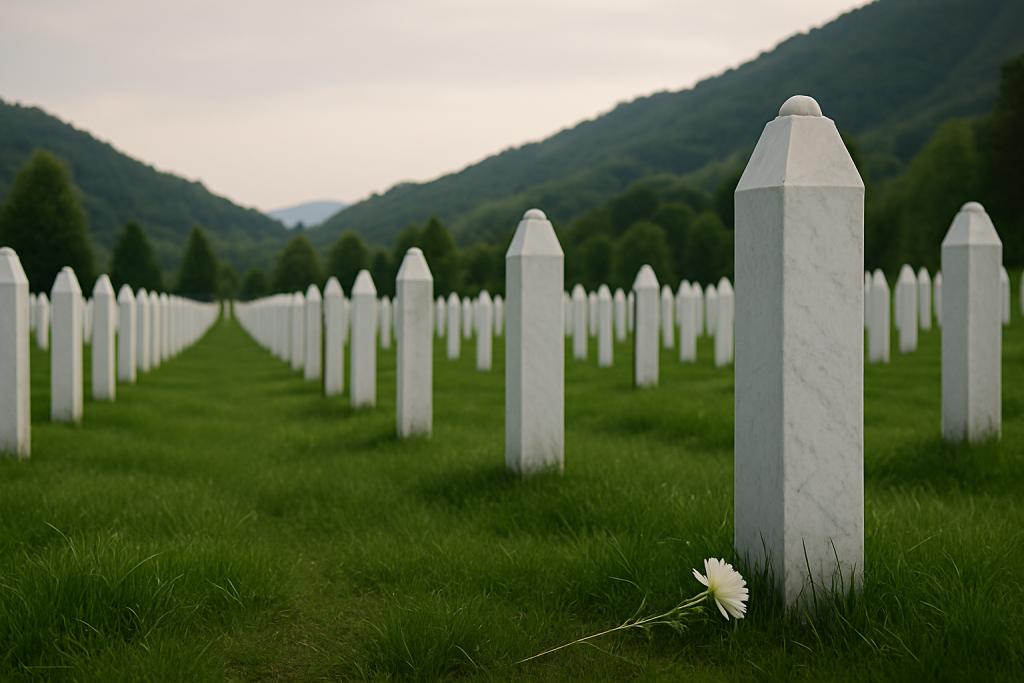On a sweltering July morning in 1995, the small town of Srebrenica in eastern Bosnia became the site of Europe’s worst atrocity since the Holocaust. Thirty years later, as the world marked the official International Day of Reflection and Commemoration of the 1995 Genocide in Srebrenica this past July, the massacre’s legacy continues to reverberate through European consciousness, challenging our understanding of collective memory, international responsibility, and the fragility of civilisation itself.
The events of 11 July 1995 did not emerge from a vacuum. They were the culmination of a devastating conflict that had torn Yugoslavia apart since 1991, rooted in the toxic intersection of nationalism, political opportunism, and historical grievances. When Bosnia-Herzegovina declared independence in 1992, it ignited a brutal war that would claim over 100,000 lives and displace millions more. The Bosnian Serb forces, led by Radovan Karadžić and General Ratko Mladić, pursued a campaign of ethnic cleansing designed to create ethnically pure territories—a strategy that would reach its most horrific expression in Srebrenica.
Srebrenica had been designated a United Nations ‘safe area’ in 1993, theoretically protected by a small contingent of Dutch peacekeepers. The designation was both a promise and a cruel deception. When General Mladić’s forces overran the enclave on 11 July 1995, they systematically separated the men and boys from the women and children. Over the following days, more than 8,000 Bosnian Muslim males were murdered in what international courts would later definitively classify as genocide—a legal determination that carries profound implications for how we understand mass atrocities in the modern era.
The international response to Srebrenica was one of shameful inadequacy that continues to haunt European foreign policy. The Dutch battalion, undermanned and outgunned, could do little more than watch as the massacre unfolded. The broader international community, including the United Nations, NATO, and European powers, failed catastrophically in their duty to protect. This failure wasn’t merely operational; it was moral, revealing the hollow nature of international guarantees when confronted with determined brutality.
Yet perhaps the most insidious aspect of Srebrenica’s legacy lies not in the massacre itself, but in the persistent attempts to deny, minimise, or reframe it. United Nations Special Advisers have repeatedly expressed concerns over continuous incidents of revisionism concerning atrocity crimes perpetrated during the 1992-1995 conflict, including unabated denial of the Srebrenica genocide. This denial is not merely academic; it represents a fundamental assault on the very concept of historical truth and justice.
The persistence of genocide denial in the Balkans reflects broader European anxieties about memory, identity, and reconciliation. When the European Parliament designated 11 July as a day of commemoration in 2009, Bosnian Serb politicians rejected it, stating such a commemoration is unacceptable to the Republika Srpska. This rejection illuminates the ongoing fragility of peace in the region and the extent to which historical narratives remain contested political battlegrounds.
The establishment of the International Criminal Tribunal for the former Yugoslavia represented a watershed moment in international justice. The successful prosecutions of Karadžić and Mladić demonstrated that even the most powerful perpetrators could be held accountable for their crimes. Yet the tribunal’s work also revealed the limitations of legal justice in addressing the deeper wounds of mass atrocity. Legal verdicts, however definitive, cannot restore the dead or heal the profound trauma inflicted upon survivors and their communities.
For contemporary Europe, Srebrenica serves as an uncomfortable mirror, reflecting both the continent’s capacity for barbarism and its ongoing struggle to construct a peaceful, integrated future. The massacre occurred not in some distant, alien context, but in the heart of Europe, perpetrated by educated, professionalised military forces against civilians who were, in many cases, their former neighbours. This proximity—geographical, cultural, and temporal—makes Srebrenica particularly unsettling for European consciousness.
The recent UN designation of 11 July as an international day of commemoration represents more than symbolic gesture; it constitutes a recognition that the memory of Srebrenica must be preserved as a bulwark against future atrocities. The General Assembly adopted a resolution on the Srebrenica genocide, designating 11 July as the “International Day of Reflection and Commemoration of the 1995 Genocide in Srebrenica”, though the measure faced significant opposition, reflecting the continued political sensitivities surrounding the massacre.
The challenge of remembering Srebrenica authentically extends beyond the Balkans. In an era of rising nationalism, authoritarian populism, and the manipulation of historical memory for political gain, the lessons of Srebrenica acquire renewed urgency. The massacre demonstrates how quickly societies can descend into barbarism when hatred is institutionalised and dehumanisation becomes state policy.
For young Europeans, particularly those born after 1995, Srebrenica might seem like ancient history. Yet the forces that enabled the massacre—ethnic hatred, political extremism, international indifference—remain potent in contemporary Europe. The rise of far-right movements across the continent, the ongoing refugee crisis, and the increasing polarisation of European societies all echo, however faintly, the conditions that made Srebrenica possible.
The survivors of Srebrenica, many of whom continue to live in poverty and trauma, represent living testimony to the consequences of international failure. Their stories, preserved in archives and testimonies, serve as crucial evidence against the forces of denial and revisionism. The annual pilgrimage to Potočari, where families bury newly identified remains, transforms personal grief into collective memory.
As Europe faces new challenges—from climate change to migration, from technological disruption to democratic backsliding—the memory of Srebrenica offers both warning and guidance. It reminds us that civilisation is fragile, that international institutions require constant vigilance and renewal, and that the price of indifference to atrocity is measured not merely in lives lost, but in the erosion of the moral foundations upon which peaceful societies rest.
The enduring shadow of Srebrenica extends far beyond the borders of Bosnia-Herzegovina. It challenges us to confront uncomfortable truths about human nature, political responsibility, and the ongoing struggle to build a world where such horrors become genuinely impossible. In remembering Srebrenica, we do not merely honour the dead; we recommit ourselves to the principle that never again must such darkness be allowed to fall across European soil.
The massacre at Srebrenica was not an inevitable tragedy but a preventable catastrophe enabled by specific political choices and international failures. As we continue to grapple with its legacy, we must ensure that its lessons inform our responses to contemporary challenges, lest we find ourselves complicit in new forms of atrocity through our silence, indifference, or denial.


